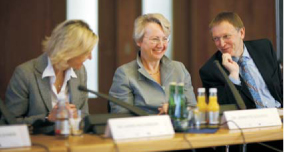Europe creates research funding agency
DOI: 10.1063/1.2731968
After five years of debate, the European Union has officially launched the European Research Council, a new agency that will concentrate on funding basic research. More than 280 scientists attended the 27 February launch in Berlin, Germany, including German chancellor and physicist Angela Merkel. The ERC will be “a champion’s league for research,” allowing excellence, promoting international involvement, and encouraging creativity and innovation in research, said Merkel.
The agency is split into two parts, a scientific council of 22 leading European scientists that acts as an independent strategic and supervising body, and another group that will manage day-to-day operations. “The creation of the ERC … represents a landmark event for science policy in our continent, “ says ERC president Fotis C. Kafatos, a molecular biologist at Imperial College London.
Over the next seven years, the agency will have a budget of €7.5 billion ($9.9 billion). Unlike other parts of the EU’s seven-year, billion-euro 7th framework (FP7) research program, which tends toward big collaborations that promote pan-European links, the ERC will mainly fund high-risk individual “investigator-driven” proposals that will be peer reviewed by independent scientists. “The ERC is a need, not a desire,” says EU research commissioner Janez Poto√nik. “We cannot compete as a knowledge economy without new, improved knowledge.”
Non-European researchers can apply for ERC funding as long as the research occurs at a European institution. The first funding round, a €300 million program to support researchers establishing their first research team or conducting independent research, will close later this month. ERC vice president Daniel Esteve says this first round could have a big impacscodet. “Start-up funds are really lacking, even in scientifically developed countries such as France.”
The ERC was designed to resist political pressure from member countries. So far, despite the transfer last December of €54 billion from the FP7’s proposed research budget to agricultural and development aid to new EU members, the ERC is unscathed.

Celebrating the launch in Berlin, Germany, of the European Research Council are Angelika Niebler, a German member of the European Parliament; Annette Schavan, German science minister; and Janez Potočnik, EU research commissioner.
EUROPEAN COMMUNITY 2007

More about the authors
Paul Guinnessy, American Center for Physics, One Physics Ellipse, College Park, Maryland 20740-3842, US . pguinnes@aip.org





